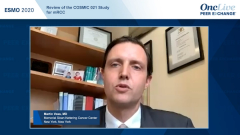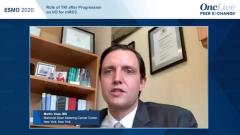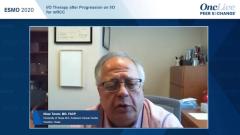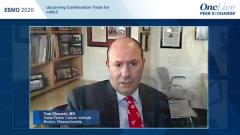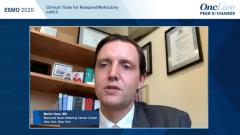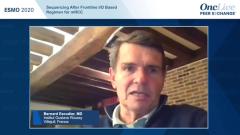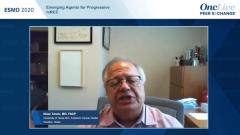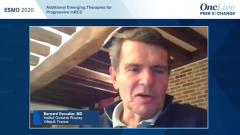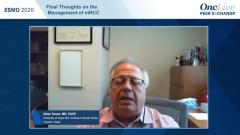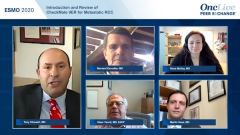
I/O Therapy After Progression on I/O for mRCC
Episodes in this series

Transcript:
Toni Choueiri, MD: To answer Martin, where I’m giving I/O [immune-oncology] post-I/O it’s nivolumab/ipilimumab, It was one of the studies we presented at ASCO [the American Society of Clinical Oncology annual meeting] 2020. We saw a 15% response rate in a non-VEGF regimen with nivolumab/ipilimumab post-I/O, and the responses were in this fraction RCC [renal cell carcinoma] trial well maintained. You could still say there is ipilimumab alone. Unfortunately, there are no studies in the modern era with ipilimumab alone. There’s an NCI [National Cancer Institute] study from many years ago with different dosages of ipilimumab that shows significant toxicity. Higher doses of ipilimumab, 3 and 10 mg/kg. But there was activity. Even in this 15%, you cannot rule out that single-agent ipilimumab. But I have been giving the combination, especially if the patient has sarcomatoid histology. Dr Tannir led a study where nivolumab/ipilimumab in untreated patients with sarcomatoid renal cell cancer, remind me, Nizar, the complete responses were 18% or 20%?
Nizar Tannir, MD, FACP: The overall response rate [ORR] was 60% and 18% CR [complete response] rate. And the median OS [overall survival] was 31 months for sarcomatoid. It's something we haven't seen before. Sunitinib for the sarcomatoid had a median OS of 13 months. It hasn't changed over a decade, 2 decades of targeted therapy. For sarcomatoid, TKIs [tyrosine kinase inhibitors] alone don't work that well. But you consider pembrolizumab/axitinib, and atezolizumab/bevacizumab also had good ORR and CRs, but the most compelling or most impressive results are with nivolumab/ipilimumab in sarcomatoid. Again, but not mentioned, those patients with intermediate risk or risk who have sarcomatoid—we're talking about clear cell here—they have 50% PD-L1 positivity, and this is where I think nivolumab/ ipilimumab works. Toni, you at [Dana-Farber Cancer Institute] did the OMNIVORE trial. The Germans or the Europeans did the TITAN study, and Michael Atkins, [MD,] led the trial with [Hoosier Cancer Research Network]…. The data are clear. If you are going to use ipilimumab, the best time to use ipilimumab is in combination with nivolumab up front, not post-pembrolizumab/axitinib or post-nivolumab monotherapy and then you do the ipilimumab later. It’s clear. The responses you mentioned, at best 15%.... Clearly, ipilimumab is, in my opinion, the drug that produces the memory T cells that provide that durability when you give I/O-I/O therapy.
Transcript Edited for Clarity


